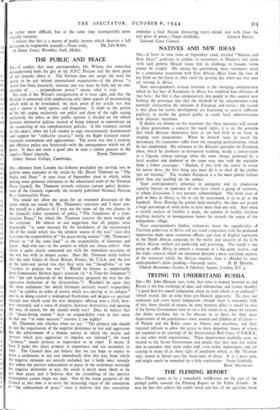SIR,—Absence from London has hitherto precluded my inviting you to
publish some rejoinder to the article by Mr. David Thomson on "The Public and Peace" in your issue of September 22nd in which, while making some generous references to the educational work of the National Peace Council, Mr. Thomson severely criticises current policy declara- tions of the Council, especially the recently published National Petition for a ConstructNe Peace.
You would not allow me space for an extended discussion of the issues which are raised by Mr. Thomson's strictures and I must con- fine-myself to a defence—if I may use the term—of the two clauses in the Council's fuller statement of policy, "The Conditions of a Con- structive Peace," for which Mr. Thomson reserves the main weight of his criticism. He objects to ou; suggestion that all peoples were responsible "in some measure for the breakdown of the international life of the world which was the ultimate source of the war," since .this is to treat the responsibility of "the peace-loving nations" (Mr. Thomson's phrase) as "of the same kind" as the responsibility of Germany and Japan. And why not—in the context to which our clause refers? Our clause is quite clearly concerned not with the immediate occasions of the war but with its deeper causes. Does Mr. Thomson really believe that the only failure of Great Britain, France, the U.S.A. and the rest in the inter-war period was that they were too " thoughtless " or too "careless to prepare for war "? Would he dissent as emphatically from Commander Herbert Agar's assertion (in" A Time for Greatness ") that "the soft barbarism of the democracies prepared the way for the aggressive barbarism of the dictatorships "? Wouldn't he agree that the 1919 settlement (for which Germany certainly wasn't responsible) tried "to stabilise an order of society which was moving to its collapse" and in so doing created a widespread frustration and despair—a spiritual vacuum into which came the new ideologies offering men a faith, how- ever irrational, and a sense of purpose, however destructive, and opening the way, of course, for the second world war? Does he believe that his "peace-loving nations" have no responsibility even in that sense or that our "in some measure" assesses it too highly?
Mr. Thomson asks whether when we say: "The primary aim should be not the organisation of the negative deterrents to war and aggression but the achievement of a human society in which the strains and stresses which give aggression its impulse are relieved ", the word "primary" means primary in importance or in time? It means (I hope I Make this clear) primary in importance and not secondary in time. The Council does not believe that we can hope or expect to make a settlement, at any rate immediately after this war, from which the negative elements are entirely excluded, but it holds most strongly that unless the positive inducements to peace in the settlement outweigh the negative deterrents to war, the result is much more likely to be War than peace and it believes that the assembling of the positive inducements cannot begin too soon. One of the major purposes of the Council at this time is to resist the increasing vogue of the conception of "the enforcement of peace" since it believes that that conception
embodies a fatal illusion distracting men's minds and wills from the
real price of peace.—Yours faithfully, GERALD BAILEY. National Peace Council.


























 Previous page
Previous page